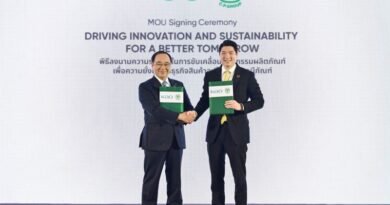Ajinomoto Elevates Thai Farmers’ Livelihoods Establishing a Biocycle for Sustainable Carbon Reduction
Ajinomoto Elevates Thai Farmers’ Livelihoods Establishing a Biocycle for Sustainable Carbon Reduction

- Thailand, the world’s third largest producer of “cassava,” faces significant challenges in cultivation.
- Upholding the Ajinomoto Biocycle and continuing the Thai Farmer Better Life Partner project, aiming to enhance farmers’ agricultural skills.
- Rolling out the “Farm School” model to enhance and sustain long-term growth for Thai farmers.
Ajinomoto FD Green (Thailand) Co., Ltd., a subsidiary of the Ajinomoto Group and a leader in environmentally friendly business practices, is continuing its “Eat Well, Live Well” approach by supporting Thai farmers in sustainable agriculture. This aligns with Ajinomoto Group’s global 2030 sustainability strategy. Through the Ajinomoto Biocycle initiative, FD Green is creating a positive social and environmental ecosystem. For the fourth year in a row, the company is running the “Thai Farmer Better Life Partner” project to tackle agricultural challenges and limitations by empowering Thai farmers. Rolling out the “Farm School” model provides knowledge and modern cultivation techniques to cassava and coffee growers, ultimately increasing their potential for sustainable farming.
Cassava is the world’s fifth most important economic crop, and Thailand is the third-largest producer globally,[1] with a market value of 69,839 million baht,[2] experiencing consistent demand growth (3-4% annually).[3] Robusta coffee is also a significant Thai agricultural product, with a market value of 1,051.59 million baht.[4] The Thai coffee market boasts an impressive growth rate of 8.55% per year.[5] Despite growing market demand, Thailand’s cassava and coffee crop production face a similar decline. Cassava output dropped from 33.5 million tons in 2015 to an estimated 24.7 million tons this year,[6] while coffee yields have plummeted from 37,992 tons in 2014 to an estimated 16,575 tons in 2023.[7] This decline reflects the major impact global warming has had on the environment and agricultural crop practices.

In addition to declining production, cassava farmers face six key issues that impact yield and quality: 1) Soil Management, 2) Cutting Selection, 3) Water Management, 4) Fertilizer Selection, 5) Plot Management, and 6) Proper Harvesting. Among these, the management of cassava cuttings is the most important process because the selected cuttings must be clean, disease-free, of good quality, and suitable for the soil. If the management process is not appropriate, it will result in low yield and insufficient quality. Coffee plantations face problems with water, fertilizer, soil, and moth management, which affects the taste and reduces yield.

Dr. Kohei Ishikawa, President of Ajinomoto FD Green (Thailand) Co., Ltd., said, “To align with Ajinomoto Group’s goal of becoming a low carbon business organization according to our global strategy for 2030, which aims to reduce environmental impacts by 50% by 2030, we are guided by the Ajinomoto Biocycle concept to create a positive environmental and social ecosystem. This year marks the fourth consecutive year of the Thai Farmer Better Life Partner project, developed to comprehensively enhance the skills and potential of Thai farmers. As Thailand’s largest user of cassava starch, Ajinomoto Co., (Thailand) Ltd. embodies the ‘Eat Well, Live Well’ approach throughout the supply chain. Our support extends from upstream to downstream, starting with sustainable agricultural practices for cassava farmers and expanding to coffee farmers, promoting mutual growth. The 2024 project targets 1,570 households across five provinces in Kamphaeng Phet, Nakhon Sawan, Tak, Loei, and Chiang Rai.”

“This year, we’re continuing our partnership with Thai farmers by launching the ‘Farm School’ program, which introduces new theories in cassava cultivation to promote sustainable farming practices. We provide in-depth knowledge and modern cultivation techniques through a unique O2O (Online-to-Offline) approach, combining online resources with real-world learning experiences. Experts organize Field Test plots to showcase 10 different sampling plots which include demonstrations on fertilizer and soil amendment use, as well as solutions to common agricultural problems faced by farmers. Farmers are welcome to visit and learn from these plots starting in June. The program also collaborates with the Department of Agricultural Extension to further support farmers by providing onsite training at the Field Test plots. Additionally, we analyze farmer knowledge to develop more targeted skills training programs. For online communication, we leverage social media platforms like Facebook, TikTok, and LINE, to create engaging content and share the latest agricultural insights and techniques. We are also planning to expand the ‘Farm School’ model to include coffee farmers, focusing on sustainable coffee production practices. Ajinomoto Co., (Thailand) Ltd. prioritizes the quality and fair pricing of raw materials, creating a positive cycle for everyone involved. We are determined to be a leader in promoting sustainable practices for the Eat Well, Live Well in Thai society.”

“After participating in the project, my farm’s yield has more than doubled. I have gained valuable knowledge and understanding of cassava cultivation, including soil analysis before planting, using fertilizers based on the analysis, and experimenting with clean, high-quality cassava cuttings. This project has also helped cassava farms in Klong Khlung District become 100% free from mosaic disease,” said Mr. Thanin Suralert, village head and leader of the farmer group in Hua Chanok Village, Wang Sai Subdistrict, Klong Khlung District, Kamphaeng Phet.
Learn more about the Thai Farmer Better Life Partner project’s activities by visiting Facebook: Ajinomoto FD Green and LINE OA: Ajinomoto FD Green.
[1] Global cassava production, Food and Agriculture Organization of the United Nations (FAO), 2023.
[2] Office of Agricultural Economics, Agricultural production information: Cassava in 2022.
[3] Mordor Intelligence Analysis, Thai cassava product demand in 2023-2025.
[4] Thai Coffee Association, Average price for purchasing Robusta coffee in 2023.
[5] Euromonitor International, Coffee market value with compound annual growth rate (CAGR) 2021-2023.
[6] Cassava production and trade survey team, Cassava Trade Association, 2024.
[7] Office of Agricultural Economics, Ministry of Agriculture and Cooperatives, 2014-2023.




